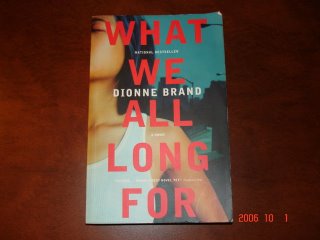What We All Long For ***
 What We All Long For
What We All Long For by Dionne Brand
The opening pages, descriptions of Toronto as a city, become a metaphor for the entanglement of the lives of the primary characters. The images of the exceptionality of each of the four seasons all but parallel the distinctiveness of the lives of the four friends around which the novel is constructed.
“Winters here are inevitable; sometimes unforgiving…The truth is you can’t prepare for something like that (sic. winter snow storms). It’s fate. Nature will do that sort of thing - dump thousands of tons of snow on the city just to say, Don’t make too many plans or assumptions, don’t get ahead of yourself.” As the story, of the four friends of immigrant parents from definably different cultural backgrounds, unfolds the message remains consistent. The unpredictability of life stream events defies logic.
The events themselves are unalterable, and it is the response to these situations on which the novel is constructed. Like spring: “Have you ever smelled this city at the beginning of spring? Dead winter circling still, it smells of eagerness and embarrassment, and most of all longing…Garbage, buried under snowbanks for months, gradually reappear like old habits.” And so the memories of the friend’s idiosyncratic childhoods emerge throughout the narrative and although they are distinctly different, the commonality of unremitting emergence of life is common. “After the gray days and the heavy skies of what’s passed, an unfamiliar face will smile and make a remark as if there had been a conversation going on all along. The fate of everyone is open again. New lives can be started, or at least spring is the occasion that makes it seem possible. No matter how dreary yesterday was, all the complications and problems that bore down then, now seem carried away by the melting streets. At least the clearing skies and the new breath of air from the lake, both, seduce people into thinking that.” This is an insightful metaphor for the circumstances of the lives of the offspring of the families as they struggle not only with their lives which are in disarray, but also the discord that results from the clash of the cultural backgrounds of the parents and the emerging “Canadianism” of the offspring.
“Bin and Thuyen were born in the city, so they were born under the assumption that simply being born counted for something. They were required to disentangle puzzlement…the children were their (sic. the parents) interpreters, their annotators, their paraphrasts, across the confusion of their new lives." There are moments of enviable parental lucidity in the remarks of ancient wisdom: About avoiding confrontation with her stepdaughter “She did not want that whisper to turn into a growl.” And in thoughts of the anti-hero on surviving a horrendous childhood and pursuing a better life: “The danger of the sky is that we cannot climb up into it; the danger of the earth is the mountains, river and hills – constant pitfalls – seek and you gain little.”
The parents live in a world of distorted recollections of past lives in other places where: “…life will be your plaything, the sky will always be blue when you are there, the rains will only come when you remember sadness.” Meanwhile, the young adults are: “trying to step across the borders of who they were. But they were not merely trying. They were, in fact, borderless.” Through an artful use of dialogue, reminiscence, and narrative the diverse experiences and world views are unified in a provocative chronicle. The novel includes the complexities of sibling relationship, the intensity of blended families, the trauma of parental suicide, the volatility of parent (and step-parent) relationships with offspring, the issues of poverty, the torment of loss, the of toxic fallout of infidelity, the tension between creativity and compliance, eccentricity and conformity,
There is bleakness to this work of fiction that implies the inevitable return of winter; that the cycle of the seasons does continue. The novel ends but the stories continue.

